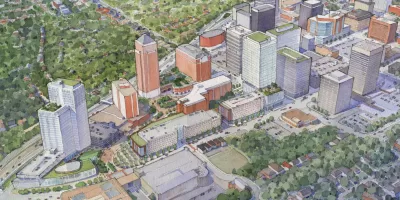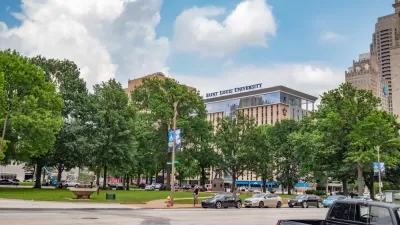The rare and elusive comprehensive planning review has been published by nextSTL.

Alex Ihnen critiques the plan for the proposed, $771.8 million Centene Clayton corporate campus, which recently had another in a series of well-attended public hearings. Ihnen writes the following preamble before launching into a comprehensive evaluation of the plans merits and demerits:
To premise the following critique, it needs to be conceded that the plan to develop vacant lots, and low-rise buildings into office towers in downtown Clayton is a good one. It’s better than good, it’s great. It has been an absurd sight as large swaths of vacant land have sat idle for a decade next to the region’s high-end business center, two MetroLink stations, and a Ritz-Carlton hotel. The $770M plan to add nearly 3,000 employees, residents, and retail to the city’s central business district is something to applaud.
Among the weaknesses of the plan, as evaluated by Ihnen, are the plan's effects on the street. "The design…completely abandons Hanley [Road] as a place for pedestrians," for instance, writes Ihnen. Moreover, "the campus master plan for employee circulation works hard to keep everyone inside, from garage to office and across the campus."
Another criticism posited by Ihnen: the need to increase the number of residential units proposed by the plan, to reduce traffic to the campus by allowing more people to live within walking distance. The plan has only taken steps in the opposite direction, according to Ihnen, decreasing from 135 to 119 in recent drafts.
Other themes of Ihnen's critique include public spaces, architecture, and NIMBYs. On that last count, Ihnen takes issue with "misplaced at best" criticisms by the opposition to the development.
FULL STORY: How Centene’s $770M Clayton Corporate Campus Project and NIMBY Opposition Fall Short

Planetizen Federal Action Tracker
A weekly monitor of how Trump’s orders and actions are impacting planners and planning in America.

San Francisco's School District Spent $105M To Build Affordable Housing for Teachers — And That's Just the Beginning
SFUSD joins a growing list of school districts using their land holdings to address housing affordability challenges faced by their own employees.

The Tiny, Adorable $7,000 Car Turning Japan Onto EVs
The single seat Mibot charges from a regular plug as quickly as an iPad, and is about half the price of an average EV.

Seattle's Plan for Adopting Driverless Cars
Equity, safety, accessibility and affordability are front of mind as the city prepares for robotaxis and other autonomous vehicles.

As Trump Phases Out FEMA, Is It Time to Flee the Floodplains?
With less federal funding available for disaster relief efforts, the need to relocate at-risk communities is more urgent than ever.

With Protected Lanes, 460% More People Commute by Bike
For those needing more ammo, more data proving what we already knew is here.
Urban Design for Planners 1: Software Tools
This six-course series explores essential urban design concepts using open source software and equips planners with the tools they need to participate fully in the urban design process.
Planning for Universal Design
Learn the tools for implementing Universal Design in planning regulations.
Smith Gee Studio
City of Charlotte
City of Camden Redevelopment Agency
City of Astoria
Transportation Research & Education Center (TREC) at Portland State University
US High Speed Rail Association
City of Camden Redevelopment Agency
Municipality of Princeton (NJ)





























